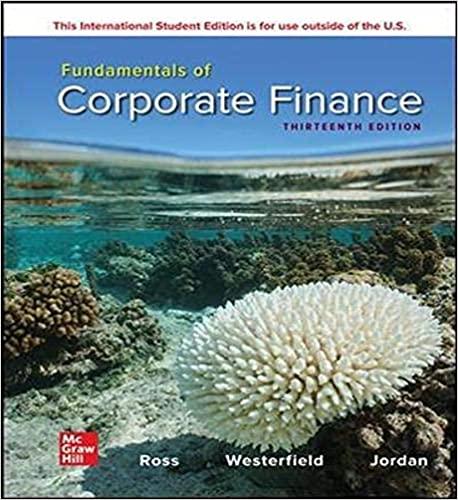a. Stock Valuation: A stock has an initial price of $100 per share, paid a dividend of
Question:
b. Total Return: You bought a share of 4% preferred stock for $100 last year. The market price for your stock is now $120. What was your total return for last year?
c. CAPM: A stock has a beta of 1.20; the expected market rate of return is 12%, and a risk-free rate of 5 percent. What is the expected rate of return of the stock?
d. WACC: The Corporation has a targeted capital structure of 80% common stock and 20% debt. The cost of equity is 12% and the cost of debt is 7%. The tax rate is 30%. What is the company's weighted average cost of capital (WACC)?
Common Stock
Common stock is an equity component that represents the worth of stock owned by the shareholders of the company. The common stock represents the par value of the shares outstanding at a balance sheet date. Public companies can trade their stocks on... Capital Structure
Capital structure refers to a company’s outstanding debt and equity. The capital structure is the particular combination of debt and equity used by a finance its overall operations and growth. Capital structure maximizes the market value of a... Corporation
A Corporation is a legal form of business that is separate from its owner. In other words, a corporation is a business or organization formed by a group of people, and its right and liabilities separate from those of the individuals involved. It may... Cost Of Capital
Cost of capital refers to the opportunity cost of making a specific investment . Cost of capital (COC) is the rate of return that a firm must earn on its project investments to maintain its market value and attract funds. COC is the required rate of... Cost Of Debt
The cost of debt is the effective interest rate a company pays on its debts. It’s the cost of debt, such as bonds and loans, among others. The cost of debt often refers to before-tax cost of debt, which is the company's cost of debt before taking... Cost Of Equity
The cost of equity is the return a company requires to decide if an investment meets capital return requirements. Firms often use it as a capital budgeting threshold for the required rate of return. A firm's cost of equity represents the... Dividend
A dividend is a distribution of a portion of company’s earnings, decided and managed by the company’s board of directors, and paid to the shareholders. Dividends are given on the shares. It is a token reward paid to the shareholders for their...
Fantastic news! We've Found the answer you've been seeking!
Step by Step Answer:
Related Book For 

Fundamentals Of Corporate Finance
ISBN: 9781265553609
13th Edition
Authors: Stephen Ross, Randolph Westerfield, Bradford Jordan
Question Posted:





